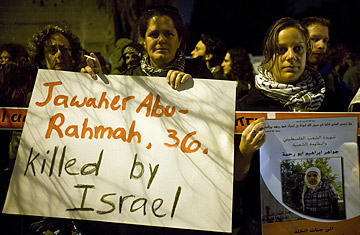
Demonstrators gather in Tel Aviv on Jan. 1, 2011, after a Palestinian woman died reportedly after Israeli troops fired tear gas at protesters in a West Bank village
The death of Jawaher Abu Rahmah on Jan. 1, reportedly from fumes inhaled after Israeli troops fired tear gas at protesters in the West Bank village of Bil'in the previous day, could easily have passed as another quotidian Palestinian tragedy. The residents of Bil'in have been protesting since 2005 over land confiscated by Israel to build its security wall aimed at shutting out Palestinian suicide bombers and for the construction of an Israeli settlement. Abu Rahmah's brother Bassem, in fact, was killed in April 2009 when he was struck by a tear-gas projectile fired during a Bil'in demonstration, and local campaigners say 20 other Palestinians have been killed there over the past five years. The Israel Defense Forces (IDF) claimed on Monday that the 36-year-old Abu Rahmah may not even have been present at the Dec. 31 demonstration, suggesting that her death may have been the result of a long-term chronic illness that was manipulated for propaganda purposes. Activists present and the Abu Rahmah family's lawyer dismiss the IDF claims.
What's beyond question, however, is that the news of Abu Rahmah's death has highlighted a new alliance emerging between a small number of Israeli leftists and Palestinians engaged in unarmed mass-protest action. Scores of Israeli activists had actually joined the Dec. 31 demonstration, and they challenged the IDF claim that tear gas was fired only after stones were thrown by protesters. The news that Abu Rahmah had died brought hundreds of Israeli Jews to a protest in Tel Aviv on the night of Jan. 1 outside Israel's Defense Ministry, where a handful were arrested. More were held later by the police after 25 protesters converged on the residence of the U.S. ambassador to Israel and allegedly threw some of the U.S.-made tear-gas canisters collected in Bil'in onto his lawn.
The self-described leftists and anarchists engaged in direct action in concert with unarmed Palestinian protests are a negligible presence on an Israeli political spectrum whose median has moved steadily to the right over the past decade. But their actions may be directed less at the Israeli political mainstream than at international civil society. The Israeli protesters often use English rather than Hebrew in placards and slogans, and explicitly connect Israel's occupation of Palestinian territories with South Africa's apartheid system. That's intended as a signal to international civil society, which helped end the apartheid regime through its support for boycotts and economic sanctions in the 1980s. Joseph Dana, an Israeli activist and the media coordinator for the Palestinian Popular Struggle Coordination Committee, says these Israeli leftists are "seeking to use the privileged access their voice carries in North America and Europe to add power to the voice of the Palestinians they struggle alongside, sidestepping engagement with [an Israeli] society that is unwilling to listen."
Their numbers may be relatively small, but the activists are certainly making their presence felt. Weekly demonstrations against Israeli settlement activity in the Sheikh Jarrah neighborhood of East Jerusalem regularly draw scores of Israelis, who have also ventured out to demonstrations elsewhere in the West Bank. Just last week, Israeli anarchist Jonathan Pollak was sentenced to three months in an Israeli prison for his role in a bicycle protest against the Gaza blockade three years ago. In court for his sentencing, an unrepentant Pollak wore a T-shirt bearing the face of slain South African antiapartheid activist Steve Biko.
As much as it irks Israel's liberal supporters in the West, the apartheid comparison with Israel's occupation is being drawn more and more frequently, even by Israeli Defense Minister Ehud Barak. Barak, of course, was using it to warn his countrymen of the danger of failing to achieve a two-state solution, which leaves Palestinians effectively ruled by a state that denies them citizenship. But its function for Tel Aviv leftists is to spur the international community to action — hoping that the fact that it comes from Jewish Israelis will counter any hesitation based on sensitivity to charges of anti-Semitism in the West.
The growing assertiveness of Israel's leftists has the authorities worried. A number have reported being questioned by the Jewish department of Israel's Shin Bet security services. And the Knesset is considering legislation, likely to pass, that would make it a criminal offense for Israelis to call for international sanctions or boycotts of their state. That may be because the symbolic weight of leftist protest in Israel is potentially far greater than its numbers. The image of Israeli police arresting Jewish Israelis dissenting from policies that the state insists are essential for security undermines government p.r. efforts to portray foreign criticism as part of an anti-Semitic campaign to "delegitimize" Israel.
The significance of the protest movement could continue to grow amid the impasse in the U.S.-led peace process — particularly as Palestinian leaders take issues like Israel's continued building of settlements outside its 1967 borders to the U.N. Security Council, where such activity is deemed illegal. Israel won overwhelming Western sympathy when it was the target of a wave of suicide terrorism attacks a decade ago, but unarmed Palestinian protests against the occupation are shifting the sympathies of Western public opinion increasingly impatient with Israel over issues like settlements.
Even if their work is unable to change the Israeli-Palestinian dynamic at the level of governments, activists like Dana believe they are having a profound grass-roots impact in Palestinian communities. "There's a generation of Palestinians in Bil'in whose idea of what Israelis are or can be has changed," says Dana. "It took time to earn their trust by approaching the community respectfully, demonstrating that we were willing to use our privileges to help their struggle. But it's certainly no longer the case, today, that the only Israelis the people of Bil'in ever encounter are soldiers and settlers."
